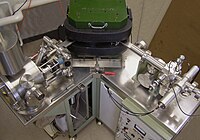
Photo from wikipedia
The increasing demand for organic foods creates, in turn, a pressing need for the development of more accurate tools for the authentication of organic food in order to ensure both… Click to show full abstract
The increasing demand for organic foods creates, in turn, a pressing need for the development of more accurate tools for the authentication of organic food in order to ensure both fair trade and food safety. This study examines the feasibility of δ13C and δ15N analyses as potential tools for authentication of environment-friendly rice sold in Korea. δ13C and δ15N examination in different rice grains showed that environment-friendly rice can be successfully distinguished from conventional rice. No multi-residue pesticides were detected in the examined rice samples, including conventional rice. This study demonstrates the complementary feasibility of δ13C and δ15N analyses for the authentication of environment-friendly rice sold in Korea in cases where pesticide residue analysis alone is insufficient for discrimination of organic and conventional rice. In future, complementary analyses including compound-specific isotope ratio analysis might be employed for improving the reliability of organic authentication.
Journal Title: Food chemistry
Year Published: 2017
Link to full text (if available)
Share on Social Media: Sign Up to like & get
recommendations!